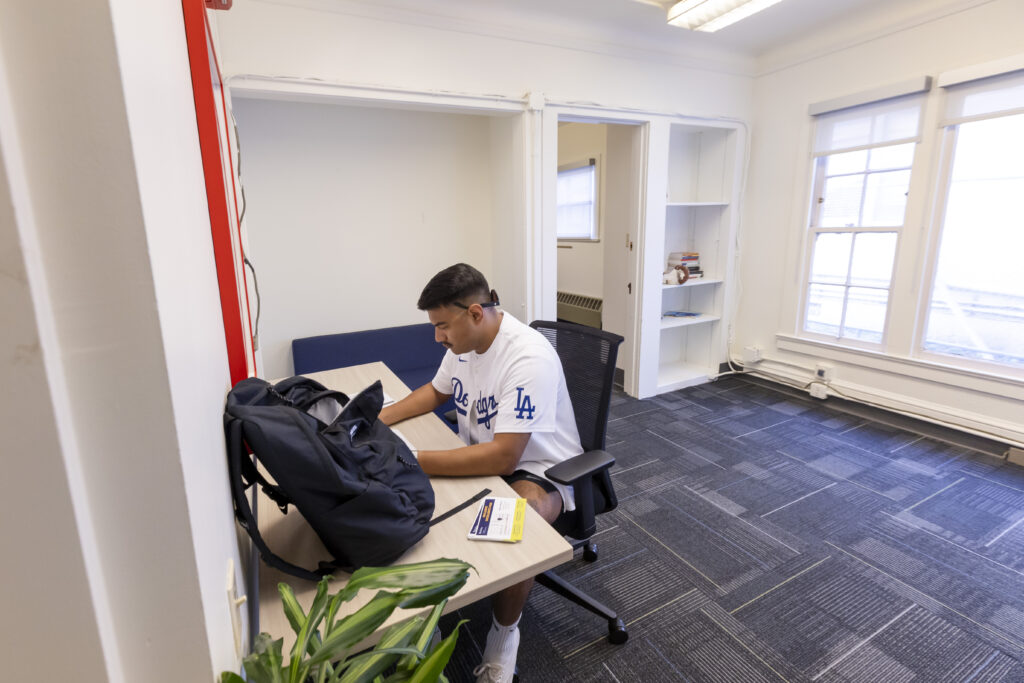Students often single out finding time to write as one of the key time-management challenges of graduate school. With the various responsibilities of being a graduate student, including teaching, seminars, and conferences, writing can often fall by the wayside. A key strategy for combating resistance to writing is learning how to establish a daily writing routine (opens in a new tab). This means treating writing as part of a routine in which discipline and consistency, rather than inspiration and bursts of creative energy, become your main motivators to start working. To establish a daily writing routine, consider the following tips:
1. Identify and establish favorable conditions
Understanding yourself and how you work is a key component to establishing a sustainable writing routine. Start by identifying your peak productivity hours. Do you complete your best work in the early morning or are you someone who prefers to work at night? Once you’ve figured that out, schedule those hours as “non-negotiable” writing time in your calendar. For example, if you know you complete your best work in the morning, try blocking off two hours in the morning where you do not work on anything except your writing. You can use tools like the Pomodoro Technique (opens in a new tab) to help you focus.
Another important strategy is to identify your optimal environment for writing. Some of us may prefer to work from home, a local cafe, a crowded spot on campus, or even the Library’s dissertation writing room (opens in a new tab). It’s also important to identify the places where you struggle to write. For example, if you notice that you tend to procrastinate by doing laundry while trying to write from home, consider moving to a space where you are less likely to be distracted by chores.
2. Identify the path of least resistance by setting small and realistic goals
The hardest part of establishing a routine is overcoming the resistance to starting. When tasks feel insurmountable and overwhelming, we are prone to either avoiding them or tackling them haphazardly.
If this applies to you, here are two strategies that can help: First, break down your writing goals into smaller components. For example, if your goal is to finish a chapter, you can break the chapter down to its different subsections and set deadlines for each section. Alternatively, you can make a time-based goal or a word count goal (i.e., write for two hours, or write 250 words). Second, start by writing what feels the most easily achievable. For example, if you find that you need to incorporate some scholarship that you are already familiar with into an existing paragraph, you can start with this task. That way you’ve already contributed to your word count and are likely to feel more motivated to move onto thornier sections.
3. Take advantage of Berkeley’s Graduate Writing Center
If you would like input on your writing or your writing process, reach out to the Graduate Writing Center for guidance, resources, and assistance. The Graduate Writing Center can help you establish a daily writing routine by connecting you to the Graduate Writing Community, a virtual peer-support writing community to help graduate students meet their writing goals throughout the semester.
Another way that you can increase your writing accountability is by joining the Graduate Writing Center’s end-of-semester writing boot camp (opens in a new tab), offered via Zoom. This fall, the Graduate Writing Center’s boot camp will be hosted during RRR week, starting on December 9, 2024. Students can join the boot camp to have daily check-ins and a system of accountability for getting major writing projects done before the end of the semester.
4. Schedule a one-on-one consultation (opens in a new tab) with a Graduate Writing Consultant at the Graduate Writing Center.
During a typical consultation, students meet with a trained peer writing adviser from Ph.D. programs across campus. You can even submit a piece of writing before your consultation to get feedback.
Visit the Graduate Writing Center website to learn more about the resources and services available to graduate students.
Maria Almeida Reis is the Hitchcock Postdoctoral Fellow in the GradPro Office of the Graduate Division. She received her PhD from UC Berkeley’s History Department in July 2024. Maria previously served as a co-director and the logistics lead of Beyond Academia and worked as a Professional Development Liaison at GradPro.
